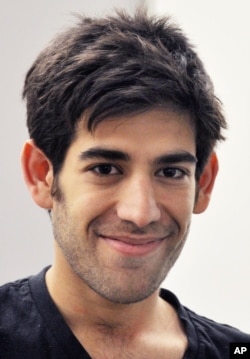From VOA Learning English, this is the TECHNOLOGY REPORT in Special English.
Have you ever had an RSS news feed sent to your mobile phone or computer? If so, you have Aaron Swartz to thank. He helped develop that Internet publishing technology when he was only 14. He also helped develop what came to be known as the social news website Reddit.
The 26-year-old Internet activist was found dead in his Brooklyn, New York apartment on January 11. His death was ruled a suicide.
Aaron Swartz believed that information is knowledge. He believed the Internet should be used to make that knowledge available to everyone. This belief is what eventually got him in trouble with the law.
He was to face a federal trial in April. He was accused of using computers at the Massachusetts Institute of Technology to download millions of scholarly documents from JSTOR. The online service charges fees to use its huge collection of research publications. Aaron Swarts could have faced 35 years in prison and as much as $1 million in fines. Some people have called the charges extreme.
Renee Hutchins is a law professor at the University of Maryland.
“It is questionable whether or not the prosecution in this case had a solid criminal case against Aaron Swartz. Basically what he is accused of doing is violating a user agreement with JSTOR.”
Professor Hutchins says Mister Swartz had legal accounts with JSTOR and with MIT, through Harvard University.
“It is a really close question whether or not Aaron Swartz use of his Harvard account through the MIT network to JSTOR to download more than he should have legitimately was a criminal offense.”
A Court of Appeals ruled that his actions violated user agreements and could be considered criminal.
However, Professor Hutchins notes that a more recent ruling by the Ninth Circuit Court disagreed.
“Unknowingly we may all be violating the terms of those agreements every single day, in multiple ways. And what the Ninth Circuit said is that’s really not the business of federal criminal statue; that that’s not what they were going for.”
Aaron Swartz’ family accused the United States Attorney’s office of fighting a crime that had, in their words, “no victims.” And they criticized MIT for refusing to “stand up for Aaron.”
MIT has called for its own investigation of its involvement in the case.
More than 40,000 people have signed a petition at the White House website for citizen opinions. It calls for the District Attorney in the case to be removed from office. The District Attorney has said the office acted appropriately in its handling of the case.
Have you ever had an RSS news feed sent to your mobile phone or computer? If so, you have Aaron Swartz to thank. He helped develop that Internet publishing technology when he was only 14. He also helped develop what came to be known as the social news website Reddit.
The 26-year-old Internet activist was found dead in his Brooklyn, New York apartment on January 11. His death was ruled a suicide.
Aaron Swartz believed that information is knowledge. He believed the Internet should be used to make that knowledge available to everyone. This belief is what eventually got him in trouble with the law.
He was to face a federal trial in April. He was accused of using computers at the Massachusetts Institute of Technology to download millions of scholarly documents from JSTOR. The online service charges fees to use its huge collection of research publications. Aaron Swarts could have faced 35 years in prison and as much as $1 million in fines. Some people have called the charges extreme.
Renee Hutchins is a law professor at the University of Maryland.
“It is questionable whether or not the prosecution in this case had a solid criminal case against Aaron Swartz. Basically what he is accused of doing is violating a user agreement with JSTOR.”
Professor Hutchins says Mister Swartz had legal accounts with JSTOR and with MIT, through Harvard University.
“It is a really close question whether or not Aaron Swartz use of his Harvard account through the MIT network to JSTOR to download more than he should have legitimately was a criminal offense.”
A Court of Appeals ruled that his actions violated user agreements and could be considered criminal.
However, Professor Hutchins notes that a more recent ruling by the Ninth Circuit Court disagreed.
“Unknowingly we may all be violating the terms of those agreements every single day, in multiple ways. And what the Ninth Circuit said is that’s really not the business of federal criminal statue; that that’s not what they were going for.”
Aaron Swartz’ family accused the United States Attorney’s office of fighting a crime that had, in their words, “no victims.” And they criticized MIT for refusing to “stand up for Aaron.”
MIT has called for its own investigation of its involvement in the case.
More than 40,000 people have signed a petition at the White House website for citizen opinions. It calls for the District Attorney in the case to be removed from office. The District Attorney has said the office acted appropriately in its handling of the case.



